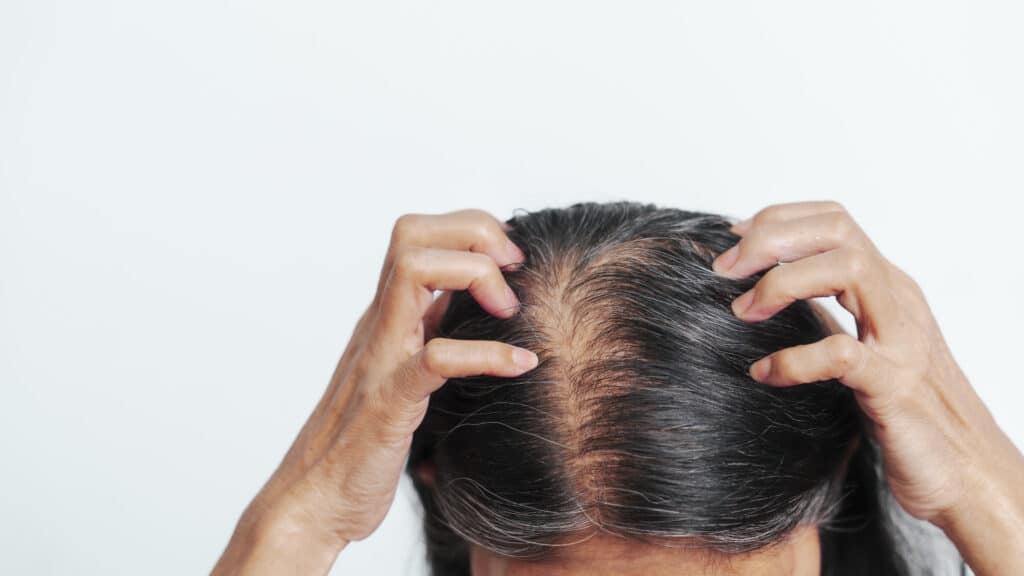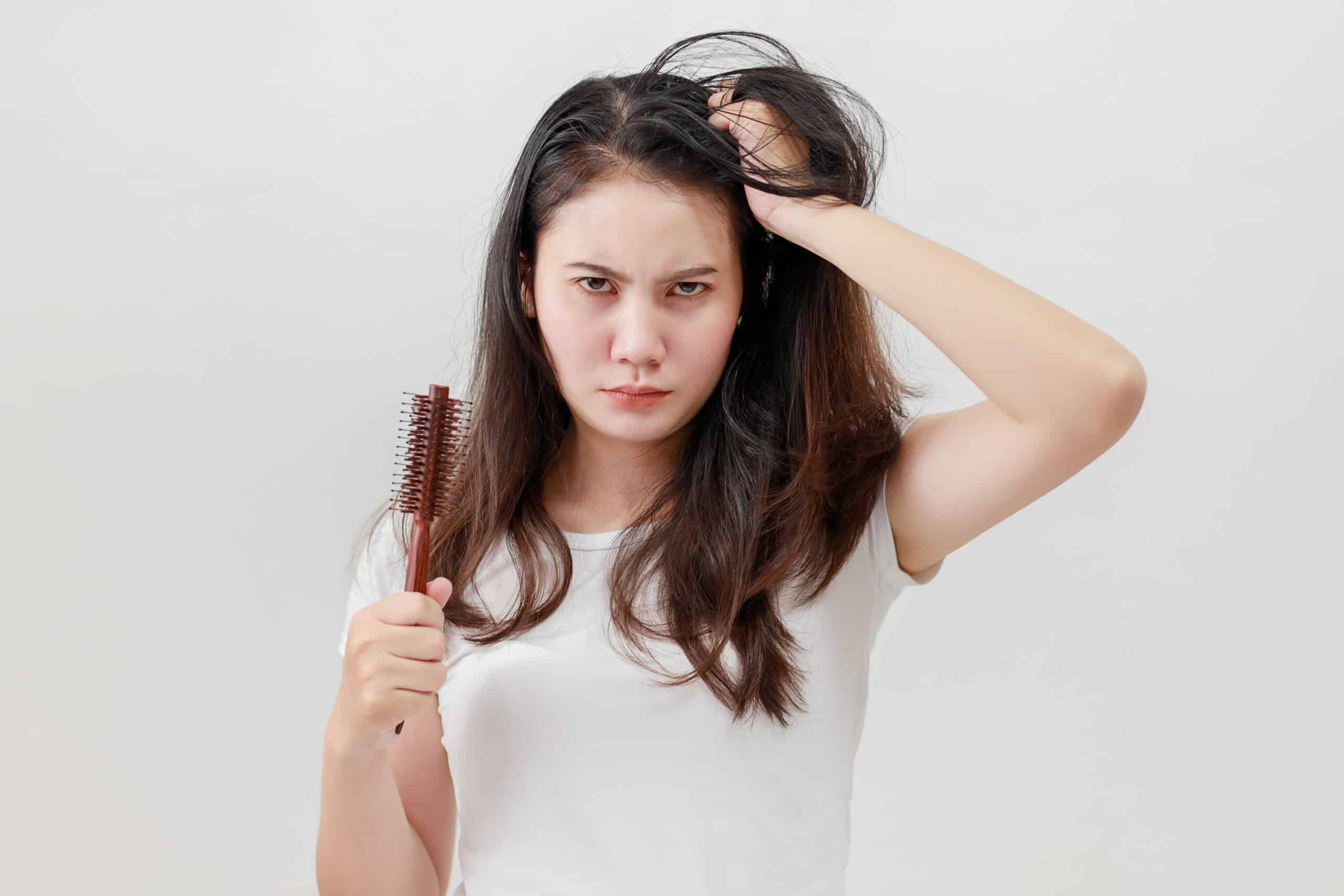Telogen effluvium is a scalp condition where most of our hair follicles are in the telogen, or resting phase, resulting in gradual hair loss. The telogen phase is a natural phase in our hair growth cycle. However, certain triggers can cause most of our hair follicles to go into the resting phase too soon, leading to more hair shedding and less new hair growth.
If you experience more hair than usual on your pillow or in the shower drain, with no itching or pain, you may be experiencing telogen effluvium. How do you know if you have it, and what are the hair loss treatments in Singapore? Read on to find out more.
Characteristics of Telogen Effluvium
Signs and symptoms of telogen effluvium include:
- Increased hair shedding — The most significant sign of telogen effluvium is excessive hair shedding. You may find more hair in the shower drain, brushes and on your pillow.
- Diffused hair loss — Unlike other hair loss conditions that happen in patterns or patches, telogen effluvium often appears as diffuse thinning across the entire scalp.
- Gradual onset of hair loss — Hair loss caused by telogen effluvium generally happens over time, with hair shedding occurring over weeks to months.
- Normal hairline — Usually, as telogen effluvium leads to diffuse hair thinning, the hairline appears normal. This differs from other hair loss conditions that cause a receding hairline or start at the crown of the scalp.
- No scalp discomfort — Unlike other scalp conditions, telogen effluvium doesn’t come with issues such as scalp itching, discomfort, flaking or pain.
Having telogen effluvium can be frustrating and take a toll on your confidence. Thankfully, this scalp condition is treatable, and hair regrowth is possible! The first step is to find out what’s triggering your condition, and addressing it with the right hair loss treatment.
Factors that Trigger Telogen Effluvium
Factors that trigger telogen effluvium include:
- Medication — Certain types of medication can cause side effects such as telogen effluvium. Some of these include oral contraceptives, androgens, retinoids, beta-blockers, antidepressants and anticoagulants. If you think your medication is causing your telogen effluvium, it is important to consult your healthcare practitioner. They would be able to confirm your concerns and provide alternative medication options if necessary.
- Physiological stress — Telogen effluvium could also be the result of severe physical stress such as surgical trauma, illness and even childbirth.
- Emotional stress — Although not completely explored, emotional stress may cause telogen effluvium.
- Medical conditions — Telogen effluvium can be triggered by a variety of medical conditions such as autoimmune diseases or inflammatory conditions.
- Hormonal changes — Hormonal fluctuations of hormonal imbalances can also cause telogen effluvium. This could be an effect of childbirth, menopause or thyroid disorders.
- Dietary triggers — Certain types of food or dietary deficiencies can lead to telogen effluvium.
- Rapid weight loss — Sudden significant weight loss can trigger telogen effluvium.
This condition is complex and a variety of factors can contribute to your hair loss. It is important to undergo a thorough scalp analysis with a professional who will be able to get to the root cause of your issue and provide a personalised hair loss treatment plan to restore hair regrowth.
What is the Difference Between Telogen Effluvium and Androgenetic Alopecia?
| Androgenetic Alopecia |
Telogen Effluvium |
| Hair loss is permanent and progressive |
Hair loss is usually temporary and stops once the cause is arrested |
| Hair will not grow back |
Hair will grow back |
| Onsets as early as 20s and develops over the years |
Onsets suddenly |
| Recession is observed around the temples and/or hairline and a bald patch near the crown of your scalp |
Hair loss is diffused across the scalp evenly, causing a ‘thin’ look |
| More common in men than women |
More common in women than men |
Hair Loss Treatment Options
The options for hair loss treatments in Singapore are plenty. Here are some medical-grade hair loss treatment options for both women and men:
- Fotona Hair Growth Laser — This hair growth laser is a patented, non-invasive procedure that uses targeted light therapy to trigger tissue regeneration and promote new follicle growth. In this 45-minute treatment, targeted laser light energy is gently delivered to deeper layers of the skin, stimulating hair growth while preventing damage to surrounding tissues. It is painless with no downtime or side effects.
- FUE Hair Transplant — This follicular unit extraction (FUE) hair transplant procedure is a minimally invasive treatment that involves shifting hair follicles from a donor area of your scalp to the targeted area experiencing hair loss. This results in a natural-looking head of hair. Unlike other surgical methods, FUE patients can get back to their daily routine within a few days after their follicle implantation procedure.
- Regenera Activa Hair Restoration — This minimally invasive hair restoration treatment involves a micrograft injection to help with hair regrowth. It is a 30-minute treatment where healthy tissues are extracted from the nape of your neck to obtain essential growth factors. These are injected into areas of the scalp to activate dormant hair follicles and induce hair growth.
- Hair Loss Medication — Common hair loss medications include Minoxidil (oral or topical) and Finasteride (oral), and, in some instances, they can even be taken together. These medications are generally well tolerated and lead to significant hair growth results. Based on your current condition, age, and other factors, your doctor will advise you on the recommended dosage based on the type of medication that would suit you best.
- Hair Loss Supplements — Hair loss supplements like Miriqa and Nourkrin supply our body with the nutrients we need to maintain a healthy hair growth cycle. Often they also contain certain ingredients that arrest the production of DHT to stop hair loss. Hair loss supplements are usually used in combination with the above treatments.
Hair Loss Treatment in Singapore
With the amount of hair loss treatments available in Singapore, choosing the right option can be confusing and daunting. The first step to a fuller, thicker hair is getting to the root cause of your hair loss, and mitigating your triggers.
SL Aesthetic Clinic offers medical-grade, minimally invasive solutions for a variety of skin and body concerns. With professionally certified aesthetic doctors, we are committed to providing holistic care and effective results. Schedule a thorough scalp analysis and get a personalised treatment plan today!


